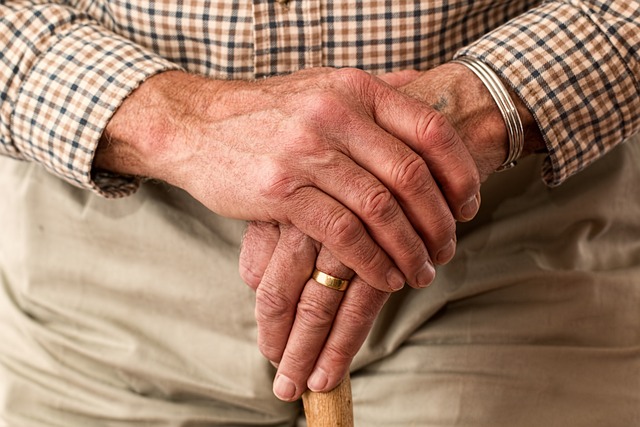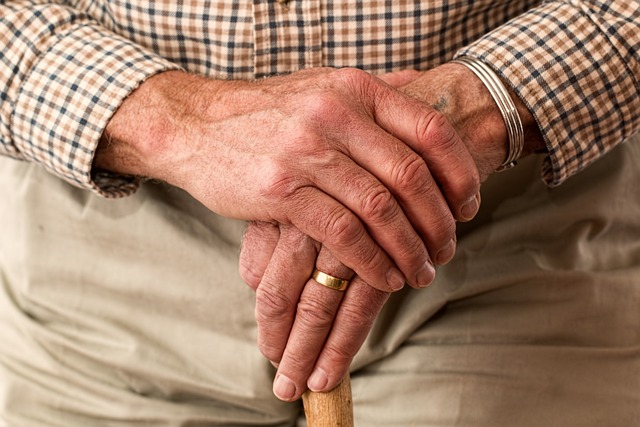The Impact of Loss in Later Life: Understanding Elderly Grief
Grief is a natural and universal response to loss, and the elderly population is no exception to its impact. However, the experience of grief in later life is unique and can differ significantly from that of younger individuals.

As individuals age, they often experience multiple losses, which can compound the grief they feel. The death of a spouse, siblings, or close friends can be particularly devastating for older adults, as it not only represents the loss of a loved one but also the loss of shared memories and a support system. Moreover, the physical and cognitive decline that often accompanies aging can lead to a sense of loss of one’s former self and abilities. These losses can evoke a range of emotions, including sadness, loneliness, frustration, and even anger, which can significantly impact an older adult’s emotional well-being and overall quality of life.
Common Triggers of Grief Among the Elderly
Losing a loved one is a universal experience that can profoundly affect individuals of all ages. However, in later life, the frequency of these losses tends to increase, leading to a unique set of challenges for the elderly. As older adults navigate their later years, various triggers can evoke grief and sorrow. The loss of a spouse or partner is one of the most significant triggers among the elderly, as it often entails the loss of a lifelong companion and source of emotional support. Coping with the absence of a close loved one can be particularly trying for older individuals, who may have built a life together and shared countless memories. The profound sense of emptiness that follows such a loss can trigger feelings of intense grief, longing, and even depression.
In addition to the loss of a spouse or partner, other triggers of grief among the elderly include the loss of friends, siblings, or adult children. As individuals age, their social circle inevitably shrinks, making each connection even more valuable. When a friend or sibling passes away, it represents the loss of shared history and support, leaving the individual to cope with feelings of loneliness and isolation. Similarly, the death of an adult child can be devastating for older adults, as it goes against the natural order of life. The pain of outliving one’s child can be overwhelming, evoking deep grief and a sense of inconsolable loss.

• The loss of a spouse or partner is one of the most significant triggers among the elderly.
• Coping with the absence of a close loved one can be particularly trying for older individuals.
• The loss of friends, siblings, or adult children can also trigger grief among the elderly.
• Each connection becomes more valuable as an individual’s social circle shrinks with age.
• The death of an adult child can be devastating and go against the natural order of life.
• These triggers highlight the unique challenges that come with navigating loss in later life.
• Understanding and addressing elderly grief with compassion and support is crucial.
Identifying the Signs of Grief in Older Adults
Grief is a natural and complex emotional response to loss, and older adults are not immune to its effects. However, the signs of grief in this population can sometimes be overlooked or misunderstood. It is essential for caregivers, healthcare professionals, and loved ones to be vigilant and observant in identifying these signs to provide appropriate support and intervention.
One common sign of grief in older adults is a significant change in their mood or emotional state. They may appear withdrawn, sad, or irritable, exhibiting feelings of hopelessness or despair. They may also experience frequent episodes of crying or emotional outbursts that seem out of character. It is important to note that these emotional changes may be persistent and not easily attributed to other factors such as physical health issues or medication side effects.
Exploring the Unique Challenges of Addressing Elderly Grief
Elderly grief presents a unique set of challenges that require careful consideration and understanding. Unlike younger individuals, older adults often face multiple losses simultaneously, such as the death of a spouse, friends, or family members, deteriorating health, loss of independence, and changes in roles and identity. These compounding losses can further complicate the grieving process, as older adults may find themselves grappling with an overwhelming sense of bereavement. Moreover, elderly individuals may struggle to express their grief openly due to societal expectations, cultural influences, or fears of being a burden to others. This can hinder their ability to seek support and navigate through their grief effectively. Therefore, it is crucial for caregivers, healthcare professionals, and society as a whole to recognize and address these unique challenges to ensure that elderly individuals receive the support they need during their grieving journey.
One significant challenge in addressing elderly grief is the tendency to dismiss or minimize their emotions. Society often holds the misconception that as individuals age, they become more accustomed to loss and therefore, should be better equipped to handle grief. However, this assumption fails to acknowledge the depth and complexity of elderly grief. It is essential to recognize that grief does not have an age limit and that older adults are entitled to experience the full range of emotions associated with loss. Validating the grief experienced by the elderly is a fundamental step in providing support and promoting healing. By fostering an environment that normalizes and acknowledges their grief, we can help older adults feel understood, respected, and supported throughout the grieving process.
The Importance of Validating and Normalizing Elderly Grief
Validating and normalizing elderly grief is of utmost importance in supporting the emotional well-being of seniors. When older adults experience the loss of a loved one or undergo other significant life transitions, they often find themselves grappling with a multitude of complex emotions. By validating their grief, we acknowledge the significance of their losses and the pain they are feeling. This validation helps to normalize their experience, reminding them that their grief is a natural response to their circumstances and not something to be minimized or dismissed.
Validating and normalizing elderly grief also plays a crucial role in facilitating healthy coping strategies. When seniors feel that their grief is acknowledged and understood, they are more likely to seek support and engage in open discussions about their feelings. This can enhance their ability to express emotions, process their grief, and find meaning in their experience. By creating a safe and accepting environment where elderly grief is validated and normalized, we can empower seniors to cope more effectively and navigate their grief journey with greater resilience.
Strategies for Supporting Grieving Seniors in their Journey
One of the most important strategies for supporting grieving seniors in their journey is to provide a safe and non-judgmental space for them to express their emotions. Often, older adults who are grieving may feel a sense of isolation or guilt for experiencing such intense emotions. By creating a compassionate and empathetic environment, we can help normalize their grief and validate their feelings.
Another effective strategy is to actively listen and offer emotional support. Sometimes, all a grieving senior needs is someone who can genuinely listen without judgment or interruption. This can be achieved by providing them with opportunities to share their memories, thoughts, and feelings openly. By actively engaging in conversations and offering comforting words, we can help them navigate the complex emotions and find solace in connecting with others who understand their experience.
Creating a Safe and Empathetic Space for Elderly Grief Expression
Creating a safe and empathetic space for elderly grief expression is essential for promoting healing and well-being among older adults. When grieving seniors are provided with a supportive environment, they feel validated and understood, which can ultimately facilitate their journey towards healing. To create such a space, it is crucial for caregivers, family members, and healthcare providers to exhibit compassion and empathy in their interactions with grieving seniors.
One way to foster a safe space for elderly grief expression is through active listening. By giving their undivided attention and genuinely listening to the thoughts and feelings expressed by grieving seniors, caregivers and healthcare providers can demonstrate empathy and validate their experiences. This validates the tremendous emotional weight that comes with grief and signals to older adults that their feelings are valid and acknowledged. Additionally, maintaining a non-judgmental attitude allows grieving seniors to freely express their emotions, ensuring that their grief is not dismissed or minimized. By creating an environment where older adults feel safe to openly express their grief, caregivers and healthcare providers can lay the foundation for healing and growth.
The Role of Social Support in Alleviating Elderly Grief
Social support plays a crucial role in alleviating grief among the elderly. When faced with the loss of a loved one, older adults often experience a multitude of emotions and challenges that can be overwhelming. Through the presence of a strong social support system, however, they can find comfort and solace during this difficult time. Whether it be through family, friends, or community organizations, having individuals who can offer emotional support, companionship, and practical assistance can make a significant difference in the grieving process.
One of the primary benefits of social support is the opportunity for seniors to share their feelings and thoughts with others who understand and empathize with their experiences. This helps to normalize their grief, allowing them to feel validated and not alone in their pain. Additionally, social support can provide a sense of belonging and connectedness, which can enhance their overall well-being and resilience. By fostering meaningful relationships and creating a safe and empathetic space for elderly grief expression, social support becomes a powerful tool for healing and finding meaning in the face of loss.
Professional Resources and Interventions for Elderly Grief
Professional Resources and Interventions for Elderly Grief:
When it comes to addressing the complex emotions associated with elderly grief, a range of professional resources and interventions are available. One of the most widely used resources is counseling or therapy, provided by trained mental health professionals specializing in grief and loss. These professionals can offer a safe and supportive environment for older adults to express their feelings, discuss their struggles, and explore healthy coping strategies. Therapy can be done on an individual basis or in a group setting, allowing seniors to connect with others who are experiencing similar challenges.
In addition to counseling, psychiatric medications may also be prescribed in certain cases to help alleviate symptoms of depression or anxiety that may accompany elderly grief. Medication options are typically determined on a case-by-case basis, taking into consideration the individual’s overall health and medical history. It is important for seniors and their families to consult with a geriatric psychiatrist or primary care physician to discuss the potential benefits and risks of medication as part of the grief support plan.

Fostering Resilience and Finding Meaning in the Aging Experience
As individuals enter the later stages of life, it becomes increasingly important to foster resilience and help them find meaning in the aging experience. Aging often presents various challenges, such as declining physical health, loss of loved ones, or changes in social roles and identities. Despite these obstacles, research has shown that nurturing resilience can contribute to better emotional well-being and overall quality of life in older adults.
One way to foster resilience in the aging population is to encourage the development of a positive mindset. This involves helping seniors embrace change and view aging as a natural part of life. By promoting a sense of purpose and meaning, whether through volunteering, pursuing hobbies, or engaging in spiritual activities, older adults can find a renewed sense of joy and satisfaction. Moreover, providing opportunities for social connections and companionship can enhance resilience by offering emotional support and combating feelings of isolation. By addressing the unique needs and challenges faced by older adults, we can empower them to navigate the aging experience with resilience and discover new sources of meaning and fulfillment.
What is elderly grief?
Elderly grief refers to the emotional and psychological response that older adults experience when they suffer a significant loss, such as the death of a loved one or the decline in their own health or abilities.
What are some common triggers of grief among the elderly?
Common triggers of grief among the elderly include the loss of a spouse or partner, the loss of independence and mobility, the loss of friends and family members, and the realization of their own mortality.
How can we identify the signs of grief in older adults?
Signs of grief in older adults may include sadness, depression, social withdrawal, changes in appetite or sleep patterns, feelings of guilt or regret, and a loss of interest in previously enjoyed activities.
What are the unique challenges faced when addressing elderly grief?
Some unique challenges when addressing elderly grief include cultural and societal attitudes towards aging and death, physical limitations that may hinder participation in traditional grief support activities, and the potential stigma around seeking mental health support.
Why is it important to validate and normalize elderly grief?
Validating and normalizing elderly grief is important because it helps older adults feel understood, supported, and less alone in their experience. It also encourages open communication and creates a safe space for them to express their emotions.
What strategies can be used to support grieving seniors in their journey?
Strategies for supporting grieving seniors may include active listening, providing opportunities for reminiscing and storytelling, connecting them with support groups or counseling services, and assisting with practical tasks or daily activities.
How can we create a safe and empathetic space for elderly grief expression?
Creating a safe and empathetic space for elderly grief expression involves being nonjudgmental, actively listening, validating their feelings, respecting cultural and religious beliefs, and providing privacy and confidentiality.
What is the role of social support in alleviating elderly grief?
Social support plays a crucial role in alleviating elderly grief by providing emotional comfort, companionship, and a sense of belonging. It can come from family, friends, support groups, community organizations, or professional caregivers.
Are there any professional resources and interventions available for elderly grief?
Yes, there are professional resources and interventions available for elderly grief, such as geriatric therapists, grief counselors, hospice services, and senior centers that offer grief support programs.
How can fostering resilience and finding meaning contribute to the aging experience?
Fostering resilience and finding meaning in the aging experience can help older adults navigate the challenges of aging and grief, and ultimately lead to a sense of purpose, personal growth, and a greater overall quality of life.


